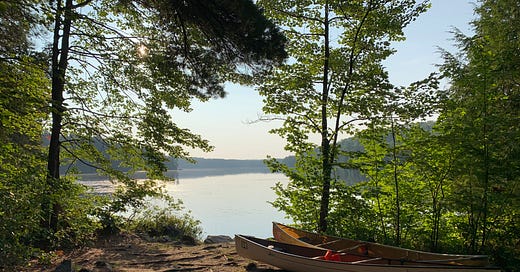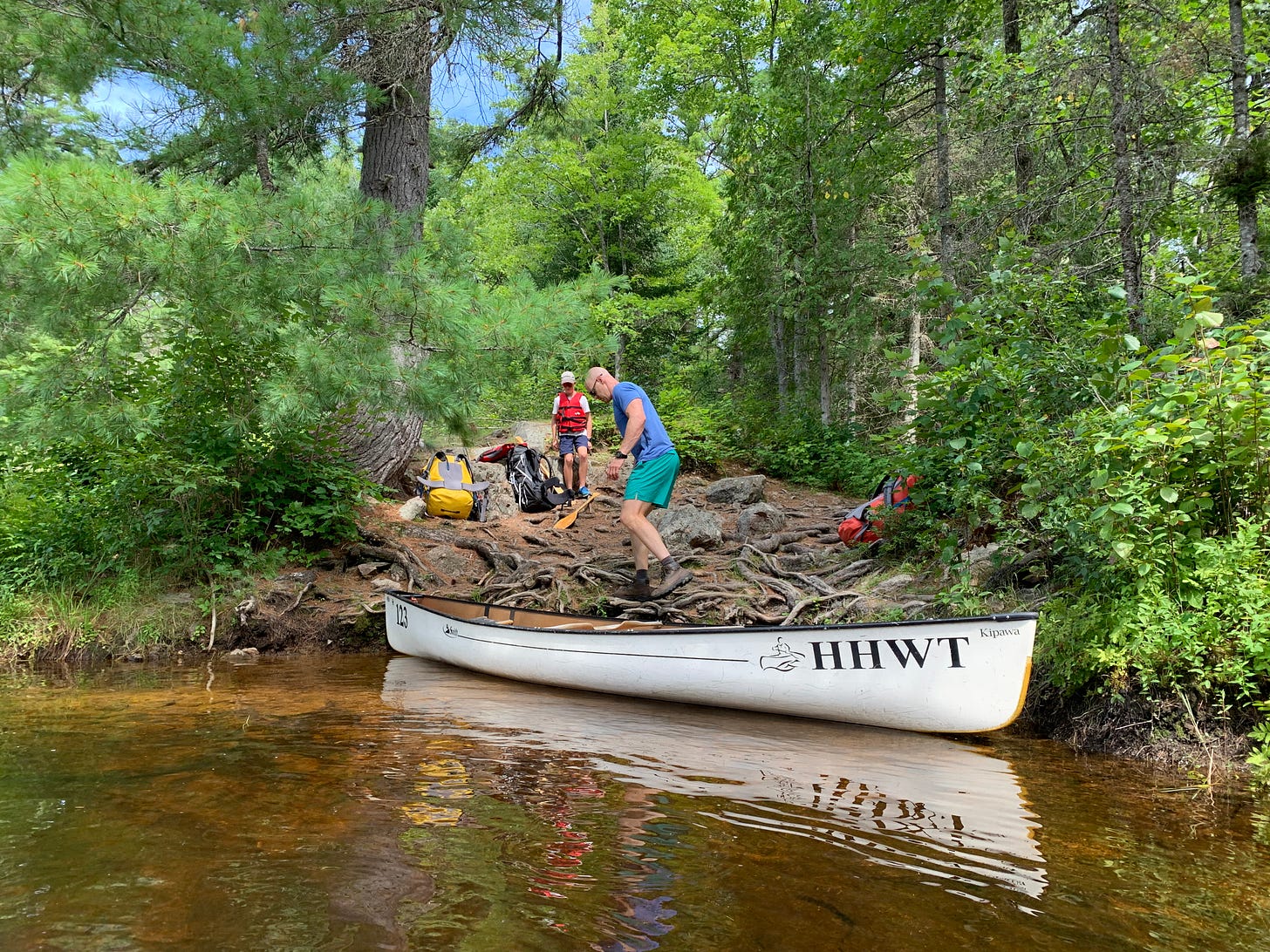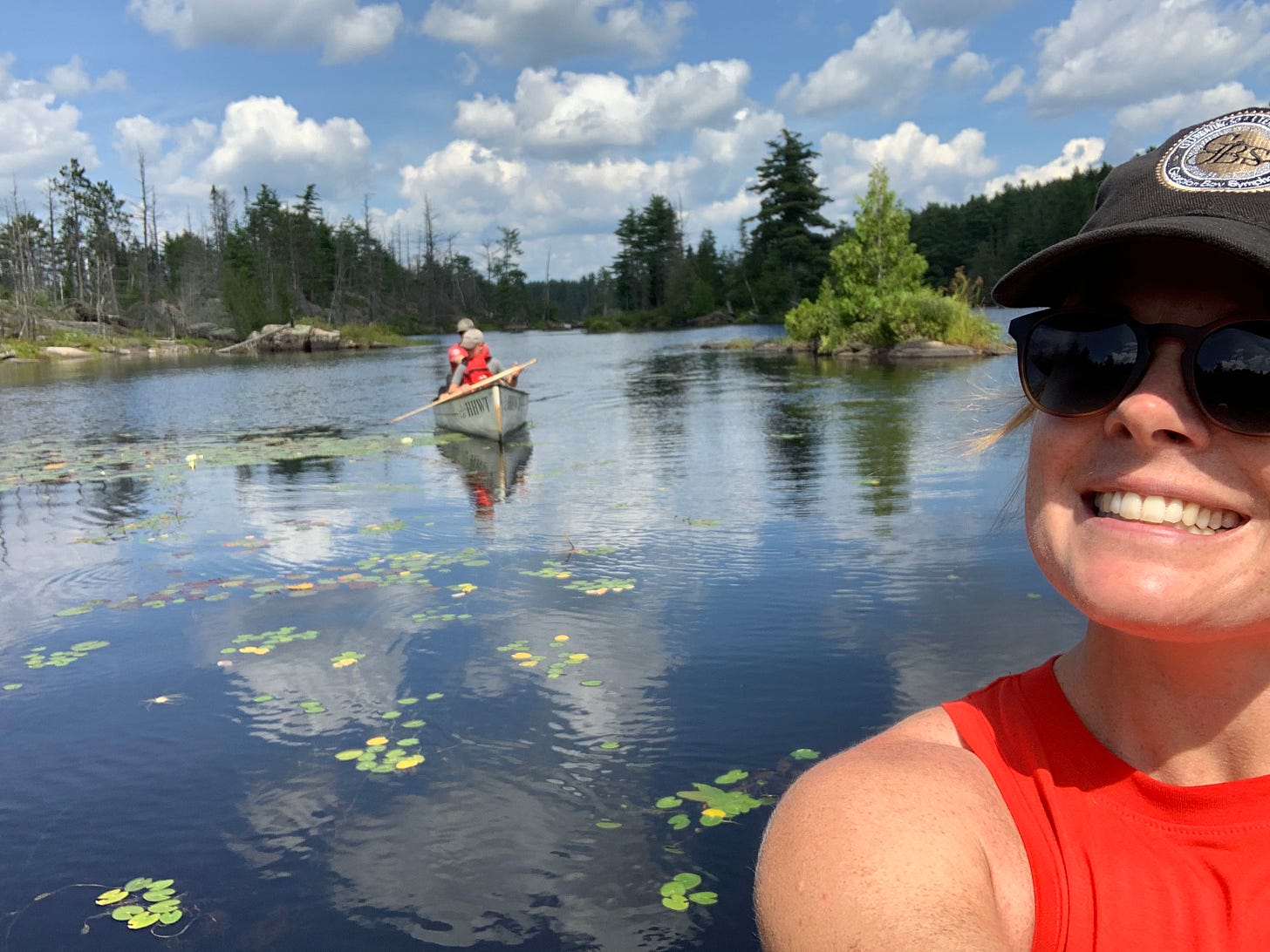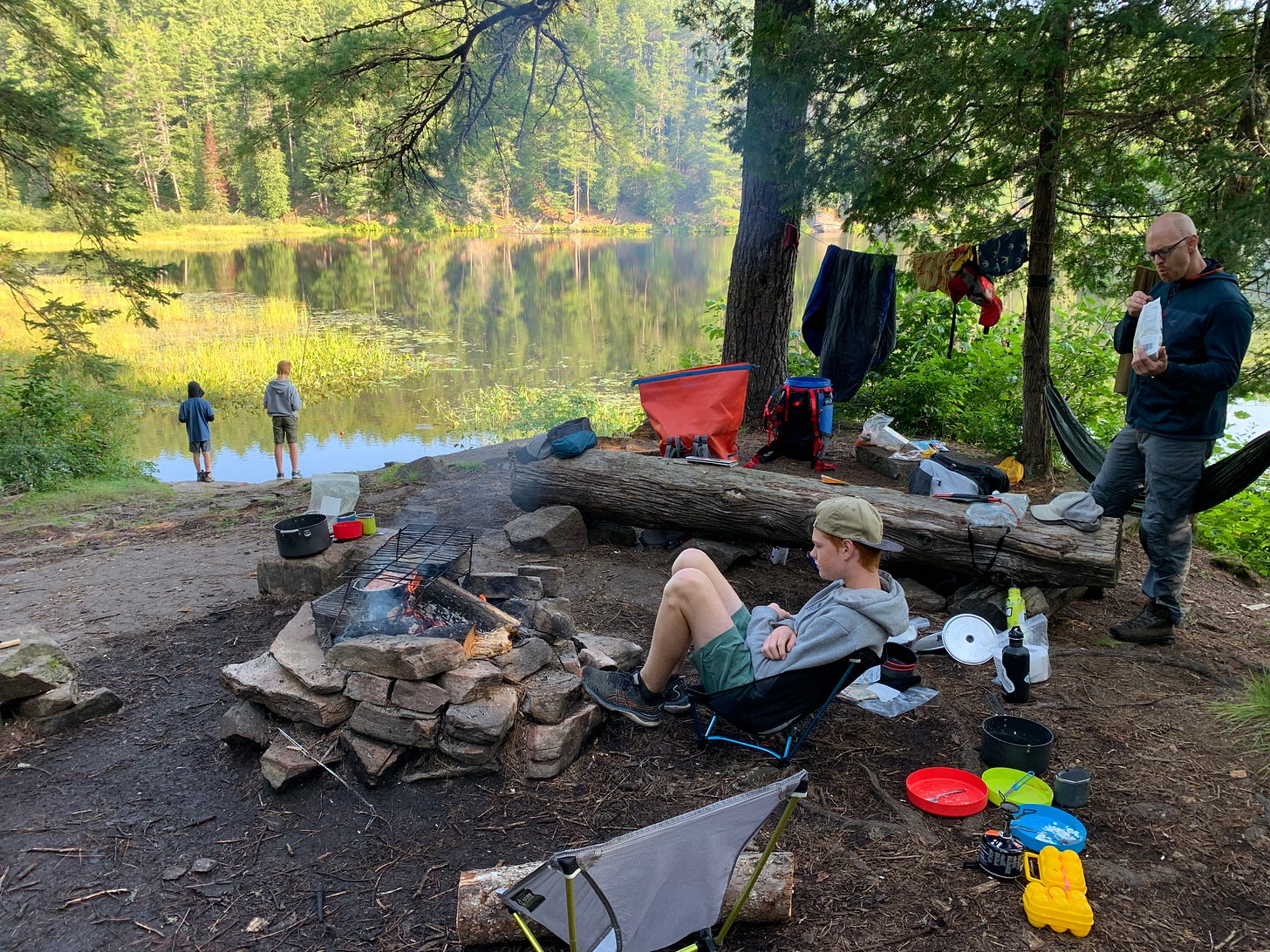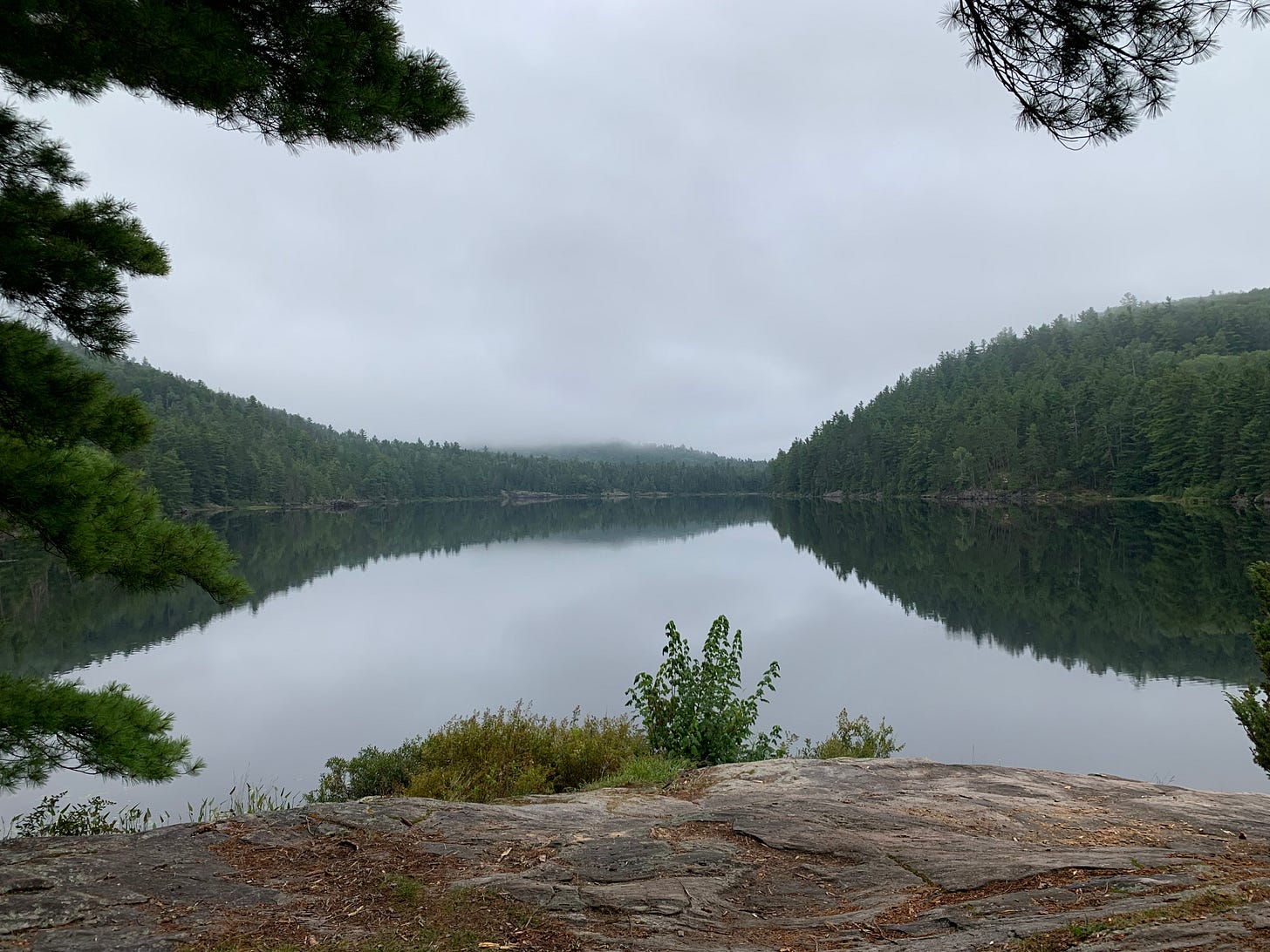My family and I have just emerged from the wilderness. We spent five days canoe-tripping through the eastern side of Algonquin Provincial Park, one of Ontario’s most famous wilderness areas. This year was the longest and furthest we’ve ever gone on a backcountry camping trip with kids. We wanted to paddle through the Barron Canyon, a spectacular cliff-lined river that is much less well-known than Algonquin’s Hwy. 60 corridor further south.
Packing food for five people for five days and four nights was not easy, especially since our route included 10 portages. A portage, for those unfamiliar with the term, is when you reach the end of a lake or river and have to carry your canoe and gear overland to the next lake. Fortunately, no portage we did was longer than 600 metres, but still, they added up—especially since my husband and oldest son and I had to do each portage twice to carry all the bags. The paths are rocky, hilly, and narrow, and when you have a canoe on your head, it’s difficult to see anything except the ground directly ahead.
But after a portage, paddling comes as pure relief. The loaded canoes glided across the surface of the lake, transporting us to whatever campsite we managed to find on the lake we had reserved in advance.
One evening, we found a particularly gorgeous site on a large, flat point covered with tall white pines. The trees created a soft bed of pine needles that (almost) made sleeping on the ground feel like a soft feather bed. Loons paddled by, serenading us with their calls. The boys found a huge black water snake sunning itself on a rock and caught a few frogs while we cooked our pasta Bolognese.
As we sat around the campfire in the bug-free evening, watching the sun set at the end of a silent lake with no signs of humanity apart from us, I got thinking about why we do this whole canoe-tripping thing. What is the point of it? I came up with numerous reasons, as I sipped my cheap boxed red wine and nibbled on the charcuterie board my thoughtful husband had provided (Oka cheese and Triscuits, in case you’re wondering).
It’s hard.
It is the most physically demanding form of travel I’ve ever done—whether I’m hauling the 75-pound food barrel for kilometers on end, balancing a 45-pound canoe on my head, or carrying double waterproof packs, front and back, along a rough trail. Sometimes we paddle significant distances, down windy lakes that make you feel like you’re making no progress whatsoever. Setting up camp takes a while, as does lighting a good fire, and cooking food. And you can only hope the weather will be nice.
By the time you collapse in front of the fire, meal in hand, especially after several days of this, your body feels drained and exhausted—but it also feels like the most satisfying accomplishment, like you’ve squeezed every bit of potential out of that day and not wasted a drop. It feels like labour for a purpose, for survival, and there’s something primally appealing about that.
It forces us to slow down.
So much of life these days happens in a blur, speeding past so fast that we hardly process what we’re doing, seeing, thinking. A canoe trip is the opposite. Life slows to a mere paddle, and suddenly you start noticing things like the dragonfly that keeps landing on your knee or the loon with a baby following behind or the number of beaver lodges encountered throughout the week (19, according to one son).
Something I always find remarkable about these annual canoe trips is that we spend days traveling from lake to lake, entertained and entranced by what we see, only to cover that same distance in a few minutes in our car once we’re done. It makes me realize just how much we must miss when we move through the world at breakneck speed—and how much we stand to gain by embracing slow travel.
We learn to appreciate our own backyard.
I grew up near the west gate of Algonquin Park, in a village called Dorset. This landscape of granite, pines, and freshwater lakes is home to me, and I want my children to know and love it, too. But because it feels like home, it does not really feel exotic or unusual.
Whenever I embark on a canoe trip, however, I am reminded that we don’t have to go far to find profound beauty and memorable experiences. We don’t have to spend a ton of money and fly to other countries or continents to seek adventure, since potential for it exists right under our noses, if we’re willing to recognize it. I try to see my home region with the same open mind and curiosity that I’ve applied to distant, foreign places.
It reminds us to live with less.
It’s amazing how little you need when you know you have to carry everything on your back. A single toothbrush. One sweater. A couple shirts. Some socks and a raincoat. Everything gets carefully considered, its value weighed. And as nerve-wracking as it is to leave so many things behind, you quickly realize their uselessness in the bush. The only things that matter are food, shelter, warmth, and companionship. I always come back from these trips more aware of superfluity and consumerism, wanting to pare down my routines and belongings to less.
It's family glue.
That is a term I coined while writing my book, Childhood Unplugged. When families share special experiences together—and are fully present for them, mentally and physically, undistracted by other people or digital media—they gain what I like to think of as “family glue.” These are rich memories that bring the family members together; they become united by sharing those common stories of adventure, challenge, reward, and whatever observations and inside jokes go along with it.
Stepping outside one’s daily routine creates new opportunities to engage with kids, too. I find that paddling in a canoe opened up interesting conversations with my teenage son that might not otherwise happen, as does sitting around a campfire in the gathering dusk.
Home feels luxurious.
Nothing feels better than coming home after a canoe trip. That first hot shower, washing my hair after a week, sleeping in a soft bed, not having to hang a food barrel from a tree for fear of bears coming in the night—suddenly, the simple luxuries of a modern home become wondrous. Chores like cooking in a real kitchen and washing up with hot soapy water in the sink are intensely pleasurable.
Never underestimate the power of removing yourself from comfort and convenience to recalibrate your appreciation for it. This goes back to the value of self-induced hardship that I mentioned at the beginning, but I think it’s important. It is all too easy to forget how truly miraculous modern amenities are.
My clean hair has barely dried and we’re still airing out the camping gear to pack it away for another year, but I’m already eyeing the Ontario map, wondering where our next backcountry adventure will take us.
You Might Also Like:
Adventures in Dawson City, Yukon
Little Cabin in the Big Woods
Wonder, an Antidote to Despair

